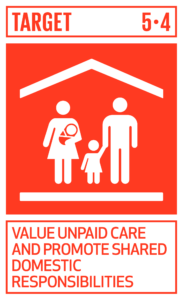Placing Target 5.4 at the Core: A Key to Accelerating SDG Synergies
06.07.25
UN New York – Ahead of the 2025 High-Level Political Forum (HLPF) MMM's written statement focuses on Sustainable Development Goal (SDG) 5 on Gender equality, which is under review this year. More specifically, we urge governments to prioritise target 5.4, which calls for measuring, valuing and redistributing unpaid domestic and care work. This particular target continues to receive insufficient attention despite its fundamental importance—not only for achieving gender equality, but also for advancing other SDGs: focusing on this target and its associated indicator can create significant synergies across SDGs implementation efforts.


The following is a summary of the written statement that MMM submitted ahead of the 2025 High-Level Political Forum (HLPF), that will take place 14-23 July at the UN headquarters in New York. SDG5 on gender equality is among the SDGs that will be more specifically reviewed this year, along with SDG3 (Good health and wellbeing), SDG8 (Decent work and Economic Growth), SDG14 (Life under water) and SDG17 (Partnerships for the goals).
Target 5.4, a neglected but pivotal target
 Despite its importance for progressing on gender equality, the implementation of Target 5.4–Recognise and value unpaid care and domestic work through the provision of public services, infrastructure and social protection policies and the promotion of shared responsibility within the household and the family as nationally appropriate–has not received enough attention and is “off track”.
Despite its importance for progressing on gender equality, the implementation of Target 5.4–Recognise and value unpaid care and domestic work through the provision of public services, infrastructure and social protection policies and the promotion of shared responsibility within the household and the family as nationally appropriate–has not received enough attention and is “off track”.
The sole indicator for this target—Indicator 5.4.1, measuring the proportion of time spent on unpaid care and domestic work disaggregated by sex, age, and location—requires Time-Use Surveys (TUS), which are expensive and complex to conduct.
Although time-use data can potentially inform policymaking in numerous areas, only 92 countries, i.e. less than half of UN Member States, have conducted TUS at least once since 2000, and only 4 since 2020. Very few countries carry out TUS on a regular basis, which would be necessary to monitor progress in reduction and redistribution of unpaid domestic and care work.
As a result, Target 5.4 is often omitted from SDG progress reports and remains out of the spotlight.
Worse, little progress has been made to date: women’s share of unpaid care work declined by just 0.2% over 15 years (1997–2012), according to the International Labour Organisation (ILO).
Interlinking target 5.4 and other SDGs
 A focus on Target 5.4—to reduce and redistribute unpaid care work—not only contributes to the achievement of SDG 5 but also advances progress on SDGs 1, 8, and 10. Likewise, recognising and supporting the vital role of unpaid care work in food security and nutrition, health, education, and sustainable consumption and production is essential to achieving SDGs 2, 3, 4, and 12. Conversely, the effective implementation of SDGs 6, 7, 9, and 11 is critical to enabling progress on Target 5.4 and SDG5 as a whole. Finally, acknowledging the impact of climate change and other crises on unpaid care work is key to shaping effective mitigation and adaptation policies (SDG13).
A focus on Target 5.4—to reduce and redistribute unpaid care work—not only contributes to the achievement of SDG 5 but also advances progress on SDGs 1, 8, and 10. Likewise, recognising and supporting the vital role of unpaid care work in food security and nutrition, health, education, and sustainable consumption and production is essential to achieving SDGs 2, 3, 4, and 12. Conversely, the effective implementation of SDGs 6, 7, 9, and 11 is critical to enabling progress on Target 5.4 and SDG5 as a whole. Finally, acknowledging the impact of climate change and other crises on unpaid care work is key to shaping effective mitigation and adaptation policies (SDG13).
To accelerate progress on the 2030 Agenda, it is therefore essential to understand and leverage the interlinkages between Target 5.4 and other SDGs. This target, along with its indicator and supporting statistical tools, must be given greater importance as a common thread running through most—if not all—of the Sustainable Development Goals.
Building synergies: centring care in policymaking
These links show that care–encompassing childcare, care and support for older persons and people with disability, healthcare and education–is inherently multidimensional and multisectoral.
A care-centred approach can also extend to caring for the environment and promoting policies that recognise the interdependence between people and ecosystems. This can help shift from extractive models to regenerative, sustainable practices and policies.
By embedding care in governance through integrated and cross-sectoral approaches rather than siloed interventions, policymaking becomes more inclusive, equitable, and sustainable–while unlocking synergies across SDGs.
Towards a care-centred wellbeing economy
Centring care in policymaking also reflects a paradigm shift from extractive, growth-driven economic models to regenerative, care-based frameworks that prioritise well-being, equity, and planetary health, and that recognise, value and support the work of caring.
Given the scale and intersectionality of today’s global crises, we must urgently recalibrate our economic priorities. Whether we call it a “wellbeing economy,” a “caring economy,” or a “doughnut economy”, it is high time to prioritise the wellbeing of people and the planet, and the sustainability of life.
It begins with recognising and resourcing care. That means elevating Target 5.4—its importance, its data, and its implications—as central to achieving the SDGs.
The New EU Gender Equality Roadmap : A Call for Inclusion of Mothers
04.03.25
The European Commission’s initiative on a new Gender Equality Roadmap post-2025, marks a significant step forward in addressing gender disparities across the European Union. Make Mothers Matter (MMM
Breaking the Cycle: Gender Equality as a Path to Better Mental Health
18.03.25
The Council of the European Union has taken a decisive step in recognising the vital connection between gender equality and mental health.
Europe Must Listen to Mothers: Our landmark report heads to the European Parliament
28.08.25
On 22 September 2025, the voices of mothers will take centre stage in Brussels. For the first time, Make Mothers Matter (MMM) will present its State of Motherhood in Europe








